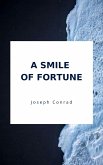CHAPTER I. INTRODUCTORY.
The ancient and famous metropolis of the North sits overlooking a windy estuary from the slope and summit of three hills. No situation could be more commanding for the head city of a kingdom; none better chosen for noble prospects. From her tall precipice and terraced gardens she looks far and wide on the sea and broad champaigns. To the east you may catch at sunset the spark of the May lighthouse, where the Firth expands into the German Ocean; and away to the west, over all the carse of Stirling, you can see the first snows upon Ben Ledi.
But Edinburgh pays cruelly for her high seat in one of the vilest climates under heaven. She is liable to be beaten upon by all the winds that blow, to be drenched with rain, to be buried in cold sea fogs out of the east, and powdered with the snow as it comes flying southward from the Highland hills. The weather is raw and boisterous in winter, shifty and ungenial in summer, and a downright meteorological purgatory in the spring. The delicate die early, and I, as a survivor, among bleak winds and plumping rain, have been sometimes tempted to envy them their fate. For all who love shelter and the blessings of the sun, who hate dark weather and perpetual tilting against squalls, there could scarcely be found a more unhomely and harassing place of residence. Many such aspire angrily after that Somewhere-else of the imagination, where all troubles are supposed to end. They lean over the great bridge which joins the New Town with the Old—that windiest spot, or high altar, in this northern temple of the winds—and watch the trains smoking out from under them and vanishing into the tunnel on a voyage to brighter skies. Happy the passengers who shake off the dust of Edinburgh, and have heard for the last time the cry of the east wind among her chimney-tops! And yet the place establishes an interest in people’s hearts; go where they will, they find no city of the same distinction; go where they will, they take a pride in their old home.
The ancient and famous metropolis of the North sits overlooking a windy estuary from the slope and summit of three hills. No situation could be more commanding for the head city of a kingdom; none better chosen for noble prospects. From her tall precipice and terraced gardens she looks far and wide on the sea and broad champaigns. To the east you may catch at sunset the spark of the May lighthouse, where the Firth expands into the German Ocean; and away to the west, over all the carse of Stirling, you can see the first snows upon Ben Ledi.
But Edinburgh pays cruelly for her high seat in one of the vilest climates under heaven. She is liable to be beaten upon by all the winds that blow, to be drenched with rain, to be buried in cold sea fogs out of the east, and powdered with the snow as it comes flying southward from the Highland hills. The weather is raw and boisterous in winter, shifty and ungenial in summer, and a downright meteorological purgatory in the spring. The delicate die early, and I, as a survivor, among bleak winds and plumping rain, have been sometimes tempted to envy them their fate. For all who love shelter and the blessings of the sun, who hate dark weather and perpetual tilting against squalls, there could scarcely be found a more unhomely and harassing place of residence. Many such aspire angrily after that Somewhere-else of the imagination, where all troubles are supposed to end. They lean over the great bridge which joins the New Town with the Old—that windiest spot, or high altar, in this northern temple of the winds—and watch the trains smoking out from under them and vanishing into the tunnel on a voyage to brighter skies. Happy the passengers who shake off the dust of Edinburgh, and have heard for the last time the cry of the east wind among her chimney-tops! And yet the place establishes an interest in people’s hearts; go where they will, they find no city of the same distinction; go where they will, they take a pride in their old home.









